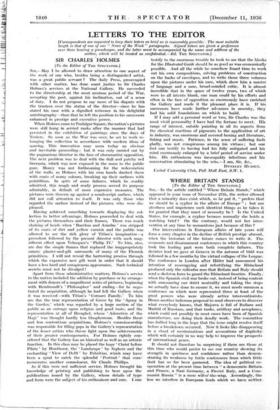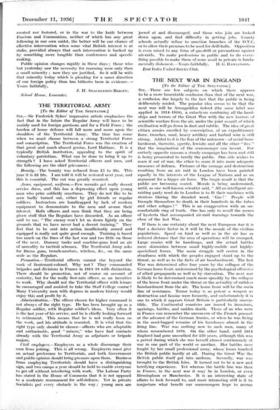WHERE BRITAIN STANDS
[To the Editor of THE SPECTATOR.]
SIR,—In the article entitled "Where Britain Stands," which appeared in your issue of November 27th, the writer allowed that a minority does exist which, as he put it, "prefers that we should be a cypher in the affairs of Europe " ; but are aloofness and impotence such identical things as he takes it for granted that they must of necessity be ? Is the United States, for example, a cypher because normally she holds a watching brief ? On the contrary, would not her inter-: vention at any time be momentous just because of this'?
Our interventions in European affairs of late years will form a sorry chapter in the decline of British prestige abroad, when the historian of the future comes to write it. The economic and disarmament conferences in which this country took the leading part Were both complete failures. The decisive lead we gave at Geneva in the autume. of 1935 was followed in a few months by the virtual collapse of the League. The conference in London after Hitler had announced his intention of reoccupying and refortifying the Rhineland produced only the riclictdus miss that Britain and Italy should' send a skeleton force to guard the Rhineland frontier. Finally,' when the Spanish civil war broke out, instead of being content with announcing our strict neutrality and taking the steps we actually have done to ensure it, we must needs surrunon a conference on which were represented three at least of the great powers who were already active interventionists., Hence another ludicrous proposal to send observers to discover what everybody knows, that Majorca is full of Italians and Madrid of Russians, and that tanks, artillery and aeroplanes, which could not possibly in most cases have been of Spanish' nianufacture,- are doing their deadly work The -committee has dallied long in the hope that the issue might resolve itself before a breakdown occurred. Nciw it Inoks like disappearing, in a cloud of recriminations and accusations of duplicity- which will certainly in no way help" to improve the prospects of international peace.
It should not therefore be surprising if there are those .at.
this time who would prefer to see our country showing its. strength in quietness and confidence rather than demon- strathrg its weakness by futile conferences from which little • fruit has so , far been garnered. The idea of political co- operation at the present time between "a democratic Britain , and 'France, a Nazi Germany, a 'Fascist Italy, and a Com- munist Russia" is a mere will-W-the-wisp. Accordingly, the. less we interfere in European feuds which we have neither ,
created nor fostered, or in the war to the knife between Fascism and Communism, neither of which ha§ any great following in our own midst, the better will be our chance of effective intervention when some vital British interest is at stake, provided always that such intervention is backed up by something more tangible than conferences and speech making.
Public opinion changes rapidly, in these days ; those who but yesterday saw the necessity for rearming were only then a small minority ; now they are justified. So it will be with that minority today which is pleading for a saner direction of our foreign policy than has hitherto been in evidence.— Yours faithfully, School House, Lancaster.
J. H. SHACIMETON-BAILEY.

















































 Previous page
Previous page